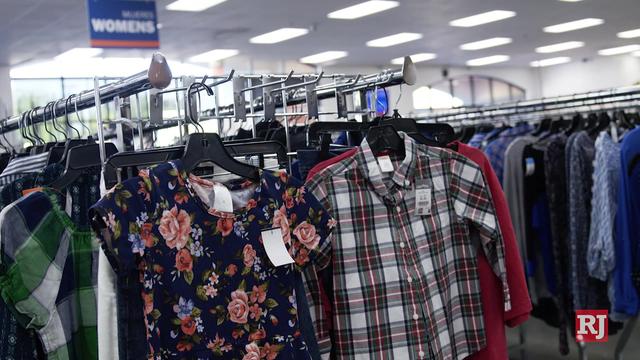Goodwill Stores Renovate Now They're Hot Renovating Stores Preparing for Growth
Goodwill has been operating thrift stores for over a century, but never really in an environment like this.
Consumers are turning to resale and thrift like never before, so it's a good time for Goodwill Industries of Dallas to have a good retailer at the helm.
Tim Heis, 43, joined Goodwill as CEO just before the pandemic, coming from Neiman Marcus, where he was vice president of strategy.
Also read: Dallas College offers free clothes to its students
Heis had played a key role in getting the Dallas luxury store chain into the resale business, and it was his idea for Neiman Marcus to acquire a minority stake in used luxury goods company Fashionphile in April 2019.
The decision was an acknowledgment of the fact that their customers were already buying used merchandise.
That experience, added to his career in retail, led Heis to take the job at Goodwill, he says.
The SMU Business School graduate with an MBA from Harvard has also worked with Bath & Body Works, Deloitte and Target.
He now runs a chain of 17 Goodwill stores that have an average transaction of $18, up from $15 before the pandemic.
“It was very astute of the Goodwill board of directors to hire someone like Tim who has a strategy and a track record in retail,” said Karen Katz, former CEO of Neiman Marcus and a board member of the grocery store reseller company. luxury The RealReal.
"He's going to take advantage of opportunities in the reselling business for Goodwill's benefit."
Although Goodwill established the thrift store business "long before it was relevant," it has more to learn from the Poshmarks and ThredUps that are expanding the segment, Katz said.
Heis said he wants to squeeze more value out of donated goods "from bag to bag."
He also wants to open more stores in neighborhoods that are more convenient for those who donate to Goodwill and those who shop at his stores.
The new set-up, signage and how merchandise is displayed in Dallas-based Goodwill's stores draw heavily from TJ Maxx.
The clothes are hung on long rows of racks and the shelves are lowered.
Housewares are at the back of the store, giving it a treasure-for-discovery feel.
TJ Maxx is a popular copycat store, and its parent, TJX Cos., has been taking market share from high-end clothing chains and department stores for 20 years.
Clothing is organized by color, and items are priced by category: Kids' clothing is $1.99, T-shirts are $3.99, Blouses are $7.99, and Jeans are $8.99.
Any item that has been in the store for more than four weeks is put at a 50% discount.
The most expensive item is men's suits, at $17.99. Housewares are individually priced, with glasses costing 55 cents each.
Heis says he has a plan to double the number of stores from 16 in September 2019, when he joined Goodwill, to between 32 and 40 by 2030.
So far there are two new Goodwill stores: One at Forest and Marsh in North Dallas that opened this month, and another on North Central Expressway in Plano near Collin Creek, which opened last summer.

In 2020, he opened an outlet store at 3020 N. Westmoreland Road that sells items for $1 a pound.
Goodwill has hired Venture Commercial Real Estate to help find locations for its stores.
Local Goodwill can grow its sales from $23.2 million in 2021 to $60 million in 2030, he said.
For every $1 in sales, 86 cents goes to Goodwill programs.
By building a better retail operation, Heis says he is fulfilling a mission to create jobs and fund job development services for people with disabilities or barriers to employment.
That larger budget would allow Goodwill to place 6,000 people in jobs, up from the 1,500 it placed last year, he said.
“We are opening doors where they were closed before and helping people plan for a better life,” Heis said.
To do that, Heis thinks like a competitor in retail.
The resale business will grow 11 times faster than general retail, according to a new annual forecast from ThredUP.
The company estimated that the total secondhand market, both through resale and donations to thrift stores, was $36 billion in 2021 and is projected to double to $77 billion by 2025.
The market is being stimulated not only by demand but also by supply. Vendors are putting more products on the market.
In addition, competition on the internet has made the market grow and generated more demand, he added.
However, Goodwill has been hurt by some for-profit thrift stores that accept donated products but give only a small fraction of their profits to charitable causes.
They confuse the consumer into thinking they are like Goodwill, he said.
As more stores open, Goodwill will create more awareness and convenience for the public in Collin, Dallas and Denton counties, which is where Heis plans to expand.
"We don't want to be the best kept secret in Dallas."
Heis has already made some big changes in preparation for that growth.
He raised wages for store clerks and they're getting more cross-training, from checkout to stocking floors.
He also decentralized warehouse operations, which allowed for a significant reduction in transportation costs.
Stores are also receiving points and can now process products and put them on display.
Before, the donations first went to the warehouse and from there they were returned to the stores.
That change allowed Goodwill to start accepting furniture donations last year. Furniture is a great second-hand category for do-it-yourself consumers.
Total donations increased 5% in 2020 to more than 836,000, but each individual donation was larger than in recent years.
About 80% of the items Goodwill receives are reusable.










Related Articles